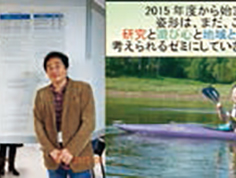

Psychological support for children and adults with intellectual and developmental disabilities who have difficulties adjusting to their environments – from the perspectives of cognitive psychology, clinical psychology and community-clinical psychology
We named our group the Special Education and Clinical Psychology Research Group for the following two reasons:
The first reason is related to the fact that the nature of disabilities is clarified when people with disabilities share the understanding of their differences from the majority with the people around them. This is because such differences from the majority are unique aspects in human beings, and special education is considered an activity in which both children with disabilities and the people around them collaboratively identify their unique aspects, contemplate how to embrace them and act. The other reason is related to the fact that people with disabilities and the people around them live in the same world. The diversity of human beings in our world brings about various relationships, connections and conflicts, and causes psychological issues in relations with opposing parties. These are universal situations covered by clinical psychology whether people have disabilities or not. In fact, special education and clinical psychology are disciplines underlying special needs education.
This research group is engaged in educational and research activities based on support for people with intellectual and developmental disabilities. The group adopts a somewhat wide range of research approaches due to the emphasis on practical considerations. Examples include: (1) experimental studies on the cognitive characteristics (unique aspects) of people with disabilities, (2) practical medical care and education for children with intellectual and developmental disabilities, (3) clinical psychological care for people with disabilities and their families, and (4) school consultation and community support networks. However, research achievements are ultimately determined by the clinical viewpoints and fieldwork sensibilities of individual researchers.
Professor ADACHI, Jun
My research interest is on support for children and adults with intellectual and developmental disabilities and their families. After spending my angsty years at a Hokkaido University graduate school, I worked at facilities for children and adults with disabilities for approximately 10 years and taught at the Hokkaido University of Education for another approximately 10 years. Accordingly, I currently serve as a researcher and clinical practitioner although I may seem more like a jack-of-all-trades because I have been involved in various projects to the best of my ability through my research and practice whenever I considered them useful for realizing necessary support. However, I believe the goal of my involvement has always been the provision of clinical support. Today, I am engaged in the following research and practice. In cognitive psychology, I study cognitive characteristics of patients with Autism Spectrum Disorders (ASD) in interpersonal exchanges using an eye tracker. I am interested in what environmental conditions can narrow the differences between people with typical development and those with ASD rather than identifying such differences. In clinical psychology, I help a group of young people with ASD develop positive self-perception, assist people with ASD to develop social skills, and study and practice psychological interviews. In community-clinical programs, I am engaged in practical studies in Hokkaido’s Kamikawa region using “support files” that cover child-rearing assistance, child development support and support for children with developmental disabilities. I was also involved in the development of a Pervasive Developmental Disorders-Autism Society Japan Rating Scale (PARS), which is used to rate the severity of anxiety in patients with ASD. PARS was adopted in the Ministry of Health, Labour and Welfare’s policy measures to support people with developmental disabilities.